Back in the mid-2000s, I came across a somewhat-famous flowchart which purported to illustrate the hierarchy by which geeks look down on each other:
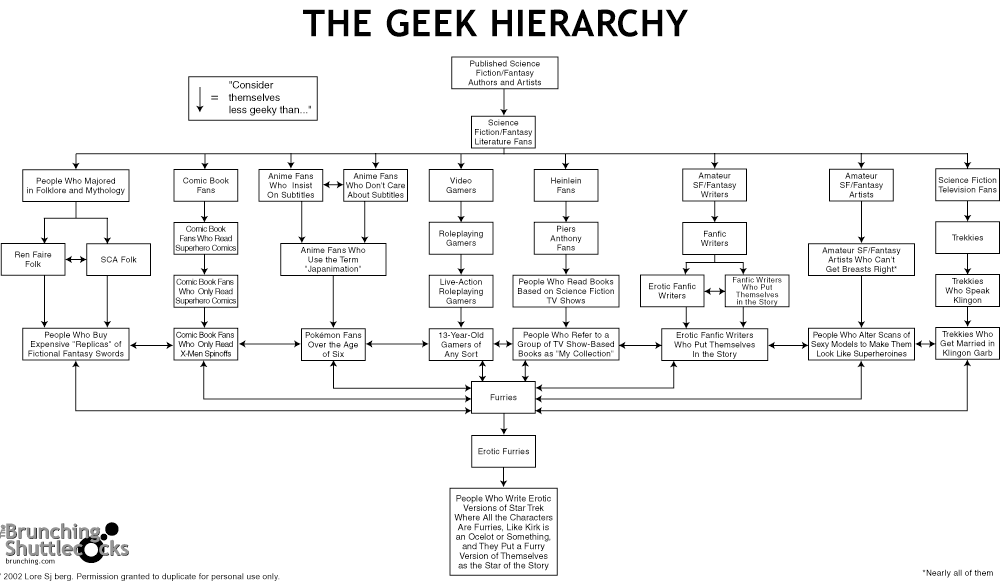
Geeks live in a pecking order. Every geek is going to be hit with a level of societal shame for having interests outside what is considered “normal”. The common response to this is to minimize that shame: “Oh sure, I may be a geek, but at least I’m not as bad as (insert geekier kind of person here).” I thought that the chart was pretty accurate when I read it. Sci-fi/fantasy literature were easily the most “acceptable” geeky pursuits, to the point that your parents and grand-parents are doing it. And furries… well, they were the punching bags of all geekdom when this was written. Seems pretty legit for 2002, all things said.
However, I was reminded of this hierarchy chart after a conversation with my son, which led me to tracking it down again. While I think the concept of this chart is fantastic, it really has not aged well. You can feel that this was written in 2002 with snippets like:
- “Pokemon Fans Over the Age of Six”: If this was written in 2002, then it would have been right at the start of the third generation of Pokemon games. This was the time when most of the original Pokemon-obsessed kids grew out of it, moved on, and Pokemania had finally ended… I can see someone at that time looking at a Pokemon fan their age and thinking “Why are you still interested in that kids thing?!” Now though? Open adoration of this franchise by people of all ages is basically mainstream culture since Pokemon Go released.
- Roleplayers are placed fairly low in the hierarchy, alongside fanfic writers. This doesn’t feel quite equivalent anymore though, not since DND5e exploded in popularity. Being into roleplaying games is also basically mainstream now.
- Furries at the bottom of the list is also very much a reflection of the time. Furries as an active subculture were still fairly new, and I imagine that the internet caused people to become more aware of the subculture. As a result, this would have been at the time when people were still reacting viscerally to anything furry-related. Even in 2008, I can recall how annoyed I’d get when a forum poster would have a furry avatar and then would submit art where a fandom’s characters had been turned into furries. Hell, a friend of mine once chatted with the guy who managed the website “God Hates Furries”, which we would frequent often for a laugh. It was the furries who would have the last laugh though (fun fact: the guy who managed God Hates Furries and my friend both ended up becoming furries years later). Eventually, the world just kind of moved on from hating furries, to the point where they’re just accepted now. If you walked into a room of geeks and started talking about how you want to use a flamethrower on all the furries, if it was the year 2002, they would have agreed and died laughing. However, in 2024, most people will look at you and wonder “why you are so weird and out of touch?” and “oh, you’re a homophobe, aren’t you?”
- It’s also worth noting that this was clearly written in a pre-GamerGate world. As I said in my 2013 review of Noobz, the racist, basement-dwelling geek was progressively seen as an outdated stereotype, up until GamerGate happened and showed the world that there really was an ugly side to geek culture and it was not going away. This has only gotten worse since then, with geek media outrage merchants grifting entire fandoms and making any kind of discourse exhausting.
Suffice to say, I had opinions on the old chart. I wanted to see what an updated version might look like in an era where geek culture has become the culture. How does that affect what is considered “normal” and what is aberrant? And how has backlash to this culture change caused certain geeks to be perceived as worse than others?
Well… here’s my take on it:
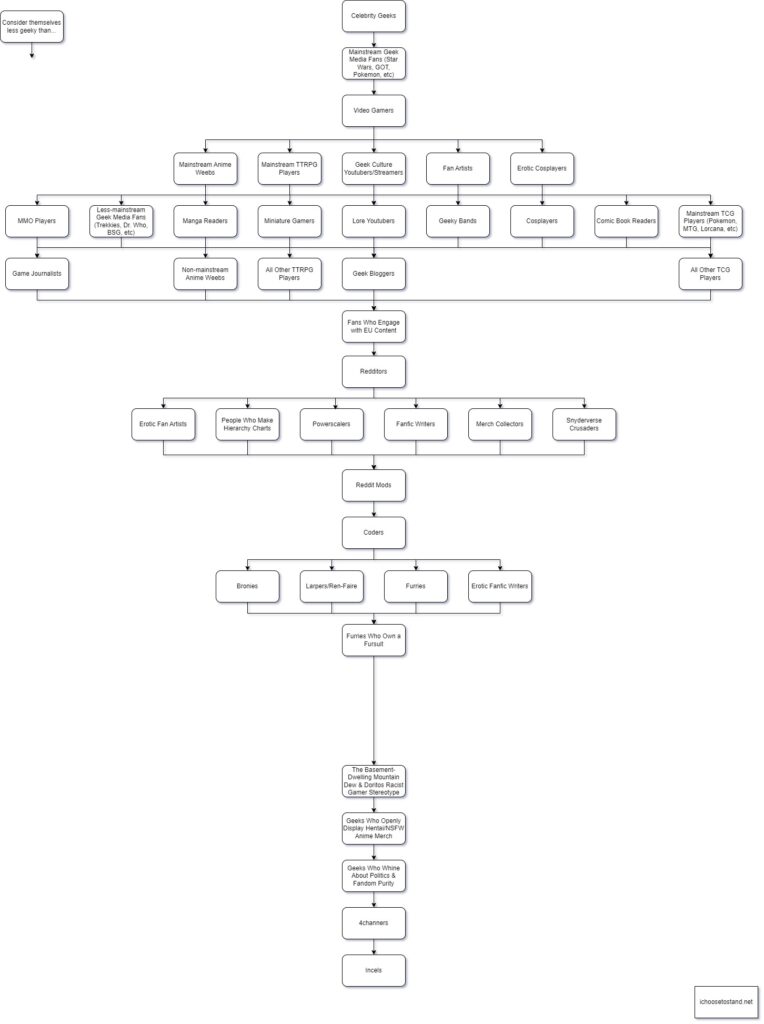
The chart pretty much speaks for itself, but I do want to provide some commentary regarding the entries. Please note, ranking in the hierarchy is not intended as a value judgement – I’ll clarify my thoughts on the rankings below, but just keep in mind that this is entirely a measurement of how geeks would classify themselves on the spectrum of geekiness.
The Mainstream
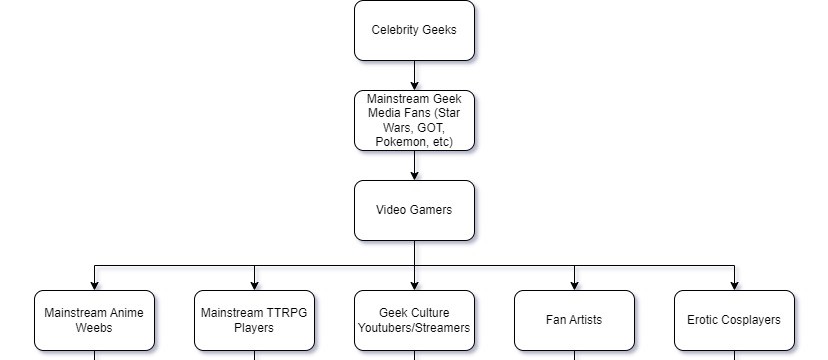
- Firstly, “Celebrity Geeks”. This ranges from your Henry Cavills, Robin Williamses, and Vin Diesels, to your Wil Wheatons, Felicia Days, or Hideo Kojimas. They may be bigger nerds than you are in some ways, but they ultimately transcend above all due to the sheer power of fame.
- “Mainstream Geek Media Fans” is pretty much a catch-all for most popular media: film, tv, and books, specifically. This would cover all the famous geek properties that are so ubiquitous that you might not even identify them as geeky at all (such as the MCU, Star Wars, A Song of Ice and Fire, The Lord of the Rings, Pokemon, etc).
- Next up is “Video Gamers”. Suffice to say, gaming is currently the world’s most popular entertainment medium, to the point of being entirely normal to engage with. In spite of this, gaming still has a bit of a lingering stink which causes it be perceived as inherently more geeky than more traditional media. Not a big deal, but enough to knock it down one spot on the hierarchy.
- And then we come to our first big branch of the hierarchy. Some of these are pretty obvious: anime and Dungeons & Dragons have become straight-up mainstream in the past decade, which has pushed them way up the hierarchy. “Erotic Cosplayers” probably deserves a clarification though: erotic cosplayers may be geeks in their own right, but there’s definitely a perception that they’re “faking” it in order to be a thirst trap for a geek audience. That’s why erotic cosplayers are actually above regular cosplayers, since they are likely to not even be seen as “real” geeks.
Pretty Geeky

- All the layers we’ve been through so far are geeky, but entirely mainstream. The next couple layers of the branch is where things start getting identifiably geeky. MMOs, by their complexities and life-eating nature, feel like they deserve to be a couple layers down from video games as a whole. This is also where we start to differentiate between the popularity of geek properties. If you asked a random, middle-age co-worker which Star Wars movie is their favourite, you’ll probably be able to have a full conversation. Now, ask that same co-worker which Doctor is their favourite, and the odds of them even knowing what you’re talking about is going to drop pretty significantly. Comic book readers should also be pretty obvious: the MCU is the biggest media franchise in the world right now, but the majority of viewers do not engage with the comics at all.
- Next up we have “Fans Who Engage with EU Content”. Going off our previous example, you ask your co-worker what their favourite Star Wars is. They say “The Empire Strikes Back” and then you respond with “the Timothy Zahn Thrawn trilogy” and then suddenly the entire conversation comes to an awkward end as they realize how much of a nerd you are. Star Wars is particularly egregious for this, as there is so much EU content that the fans who engage with it are basically an entirely separate fandom from those who just watch the movies. As a result, I think it’s entirely fair for this kind of geek to get placed lower down on the hierarchy.
Fuckin’ NEEEEEEERD

- And then we come to “Redditors” and the next branch of associated concepts. Tumblr probably would have also had a place here at one time, but it has been largely usurped over the past several years by Reddit as the popular gathering place online for geeks. Reddit, by its nature, fosters insular communities and specialized interests, which can push a geek to the next level of obsession. The branches coming off of it are directly related: “oh, sure, I may be a Redditor, but at least I am not posting erotic fan art/arguing about who would win in a fight/showing off my Funko Pops/etc”. Oh, and of course, every Redditor thinks that Reddit mods are the biggest geeks there.
Out-and-Proud Stereotypical Geeks
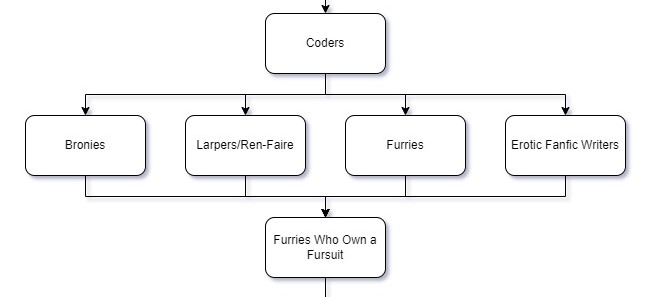
- Then we get to the low-mid layer, where things get undeniably geeky. “Coders” really speaks for itself – if you’re making your own programs and video games, you’re definitely going to be seen as very geeky, even if it’s in a professional capacity. Bronies, LARPers, ren faire folks and furries are all the biggest geek stereotypes, but that’s the funny thing about how things have changed since 2002 – there’s not only way more acceptance for these groups, but they own their geekiness moreso than anyone else on the hierarchy. So, while furries are still somewhat low on the hierarchy, there’s no longer the scorn you could feel for them in the original chart, which is a nice change. No, that scorn has now gone to…
The Basement-Dwellers
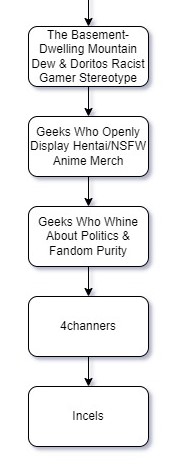
- Aaaand that takes us out of the “socially acceptable” geeks and the looooong drop down to the bottom rungs of the hierarchy. “The Basement-Dwelling Mountain Dew & Doritos Racist Gamer Stereotype” is what it sounds like – the sort of dickhead who emerged during GamerGate to announce that they actually were proud to be the shit stains that everyone thought that gamers had moved beyond a decade earlier. They’re definitely a lot rarer now adays, but when you come across one, you can’t help but cringe.
- If you’ve been to any kind of geek convention, then you definitely have cringed at a “Geek Who Openly Display Hentai/NSFW Anime Merch”. Say what you will about how acceptable this is, but you can’t deny that most people are going to see this and think “At least I’m not that much of a geek”.
- Next up is “Geeks Who Whine About Politics/Fandom Purity”, arguably the most annoying people in modern geek culture. Some of this comes from general culture war brain rot, some of this comes from too much exposure to outrage grifters, and some of this comes from geniune concerns about changes to the fandom over time. Whatever the source, they manifest this concern by being insufferable and toxic, polluting fandom discourse and making engaging in the community exhausting. As a result, any fandoms where these kinds of geeks are accepted ends up pushing the less-geeky folks out, leading to an endless spiral where those communities become more and more geeky and more and more toxic at the same time.
- The next level is, of course, 4chan, notorious for all manner of geeky degeneracy (and home to many of the aforementioned “unacceptable” geeks). This is largely down to how much 4channers have embraced their worst stereotypes as NEETs and degenerates. 4channers may not be so bad individually, but 4chan itself acts as a rallying point for less-extreme geeks: “Hey, I may be a basement-dwelling Mountain Dew and Doritos racist gamer, but at least I’m not a 4channer”.
- Finally, we have the punching bags of the internet, the incels. These feel like the most obvious omission from the original chart to me, to the point where “incel” has become a mainstream insult. Do incels deserve this scorn? Certainly not all of them, but considering the hateful environments incel forums become and the prevalence of incel mass shooters and the subsequent praise of these shooters within incel communities, it’s no wonder that these kinds of geeks get absolutely shit upon.
And that’s my modern take on the hierarchy. You could definitely argue that there’s room for refinement and I’m sure I’ve missed some pretty big types of nerds, but I’m fairly happy with the result. Not bad, considering that I put this chart together and wrote most of this article while high on edibles.
If you liked this article…
I hate ads. You hate ads. In order to stop polluting my site with obtrusive and annoying ads, I’ve elected to turn them off on IC2S. That said, writing still takes time and effort. If you enjoyed what you read here today and want to give a token of appreciation, I’ve set up a tip jar. Feel free to donate if you feel compelled to and I hope you enjoyed the article! 🙂